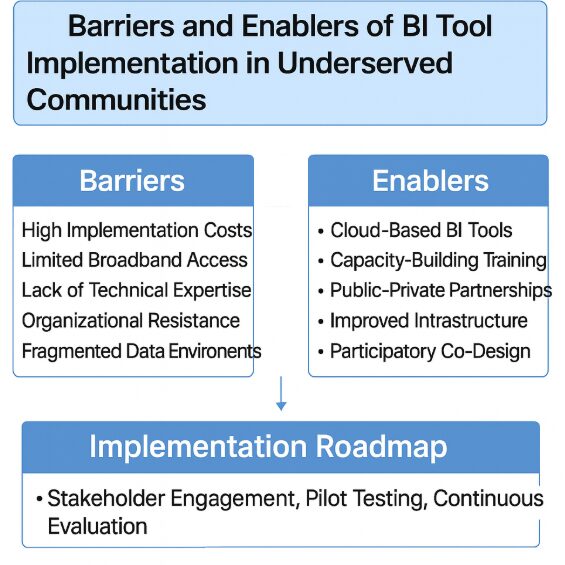In an era where data is the world’s most valuable resource, access to analytics tools should be democratized. Yet, in underserved regions around the world, including parts of the United Kingdom, Small and Medium Enterprises (SMEs) continue to face significant barriers in adopting Business Intelligence (BI) systems. These tools, essential for data-driven decision-making, remain largely out of reach due to cost, infrastructure deficits, skill shortages, and lack of contextual relevance. One researcher, Azubike Collins Mgbame, has dedicated his academic efforts to exploring these challenges and offering tangible solutions. His groundbreaking study, “Barriers and Enablers of BI Tool Implementation in Underserved SME Communities”, co-authored with Oyinomomo-emi Emmanuel Akpe, Abraham Ayodeji Abayomi, Ejielo Ogbuefi, and Oluwatobi Opeyemi Adeyelu, and published in the IRE Journals in January 2020, delivers one of the most comprehensive analyses of the limitations and opportunities shaping the digital capabilities of SMEs in economically marginalized areas.
What sets this research apart is not only its depth but also its real-world applicability. Mgbame and his team are not content with academic diagnosis, they offer a blueprint for change. The study identifies six interconnected barriers, financial, technical, organizational, infrastructural, cultural, and vendor-related, that explain why BI tools have failed to penetrate the SME ecosystem in many regions. High implementation costs, for instance, deter cash-strapped businesses from investing in BI systems. Fragmented data environments, unreliable internet, and limited electricity supply render even the most affordable tools ineffective. Many SMEs still operate in low-tech settings, with a cultural reliance on intuition and paper-based systems. Mgbame calls this a “status quo trap,” where survival strategies obstruct strategic thinking.
The UK is by no means immune. While Britain is ranked among the world’s most technologically advanced economies, its SMEs, especially those based in rural Scotland, North East England, and coastal Wales, still report significant digital adoption gaps. A 2019 report by the Federation of Small Businesses (FSB) revealed that nearly one in four SMEs still lack access to affordable digital solutions. These realities mirror the exact barriers outlined in Mgbame’s study. Poor broadband access, unaffordable software licenses, and low digital literacy plague small family-run enterprises in Skegness as much as they do in Sagamu.

However, Mgbame’s research is not a tale of despair. On the contrary, it is a detailed, data-rich investigation into what works. It highlights key enablers, affordable cloud-based BI tools, open-source platforms, digital literacy training, and policy support, that can empower SMEs to overcome barriers. The introduction of scalable cloud solutions has revolutionized access to analytics, allowing SMEs to pay only for what they use. These technologies require fewer upfront investments and offer plug-and-play features suitable for low-infrastructure environments. Coupled with open-source platforms, they open a path to customisable, lightweight tools that do not overwhelm users with complexity.
Training is another critical enabler. Many SMEs fail not because they lack interest in BI, but because they lack the skills to use it effectively. Mgbame advocates for community-based capacity-building programmes tailored to the learning pace and local context of SMEs. This includes visual training materials, multilingual support, and hands-on workshops delivered by local mentors. Without such targeted training, even the best-designed BI tools are destined to fail.
The study also calls for strong leadership within SMEs. Business owners who understand the strategic value of BI can drive organisational change. Leadership commitment is crucial to shift mindsets away from analog operations toward digital engagement. In addition, the paper urges governments to develop inclusive digital policies. Grants, tax reliefs, and subsidies aimed at SMEs can remove cost barriers. At the same time, governments must improve digital infrastructure, especially in underserved areas so that BI tools can function reliably. For instance, regional councils in the UK could fund high-speed internet rollouts and partner with local chambers of commerce to run digital skills academies, as proposed in the study’s implementation roadmap.
Perhaps the most compelling argument made by Mgbame is the need for participatory co-design. Rather than building complex BI tools in Silicon Valley or London and then exporting them to SMEs, the paper proposes co-creating BI tools with SME owners. This grassroots approach not only improves the relevance of the tools but also increases the likelihood of adoption. The research suggests that SMEs be involved in the design phase, providing feedback on interfaces, features, and language options. In practical terms, this could mean building sales dashboards for corner shops in Huddersfield or inventory apps for agro-processors in Delta State, all based on real-world input.
The roadmap outlined in the paper provides a clear, step-by-step guide for implementing BI tools in low-resource environments. It begins with a diagnostic assessment to gauge SME readiness, followed by stakeholder mapping, co-creation workshops, pilot testing, and scale-up strategies. The roadmap also includes recommendations for continuous training, community-led mentorship, and impact evaluation. The timeline for implementation is realistic, 24 to 36 months, and adaptable to local contexts. Early adopters can serve as champions, demonstrating success stories to others in their communities.
In terms of research methodology, the study is rigorous. It follows the Preferred Reporting Items for Systematic Reviews and Meta-Analyses (PRISMA) framework, analysing over 100 sources and distilling insights from 35 carefully selected studies. The authors apply both the Technology-Organisation-Environment (TOE) model and the Diffusion of Innovation (DOI) theory, providing a multi-dimensional understanding of how innovation spreads or fails to spread among SMEs.
The policy relevance of this work is significant. As the UK prepares to recalibrate its post-Brexit economy and narrow its regional inequality gap, Mgbame’s framework offers a timely intervention. Local authorities can use this research to inform SME support schemes. Technology developers can build on these insights to create simpler, more context-aware platforms. NGOs and academic institutions can use the roadmap to structure digital inclusion programmes that do not merely hand over tools, but build ecosystems around them. Importantly, this research shifts the narrative from blaming SMEs for slow adoption to understanding their systemic disadvantages. It repositions SMEs not as laggards but as potential leaders, if only given the right support.

Mgbame himself remains humble about the impact of the study. “We’re not trying to be heroic,” he says. “We’re trying to be useful.” His work is already attracting attention from international donors, African development agencies, and UK-based SME networks exploring cross-continental partnerships. He envisions a future where underserved communities are no longer data deserts but thriving nodes of digital intelligence. “Every business, no matter its size or location, deserves the power to make decisions based on facts, not guesswork,” he says.
The study closes by acknowledging its limitations, namely, the lack of empirical fieldwork. It is primarily conceptual, offering frameworks rather than statistical findings. However, this is not a weakness but an invitation. The paper serves as a foundation for future studies to test these frameworks in specific regions. Mgbame and his team have laid the intellectual groundwork. It is now up to policymakers, technologists, and community leaders to build on it.
The broader implication of this work is not just about BI adoption. It is about the structure of opportunity in a digital age. If the Fourth Industrial Revolution is to be inclusive, it must reach beyond London tech hubs, beyond Lagos data centres, and into the workshops, markets, and main streets where millions of SMEs operate. Mgbame’s study is a call to close the digital gap not by flattening the curve of ambition, but by expanding the circle of support.
By offering a context-aware, collaborative, and practical roadmap, this research sets a new standard for how we think about digital equity. It reminds us that the future of business intelligence isn’t just about big data. It’s about big inclusion. And in that vision, Azubike Collins Mgbame stands as one of the clearest, boldest, and most credible voices.


































